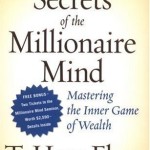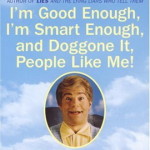I’m making my way through a list of some of the most popular personal finance books,[1] and next up is The Secrets of the Millionaire Mind: Mastering the Inner Game of Wealth, by T. Harv Eker.
Even though Eker offers some important insights, I can’t in good conscience recommend this.
First, the good parts
Eker digs in right away with the proposition that we are our own worst enemy when it comes to financial success. If saving money eludes us, or high-interest consumer debt burdens us, we probably need to do some soul-searching about our own relationship to money.
Did we learn from our parents that money was evil? Did some childhood experience make us likely to spend money beyond our means? Do we feel deep down that we do not deserve to be wealthy?
I’m not sure this applies in every case (some of us are just flat broke and its not psychologically-rooted) but I do think money brings out the irrational in everyone. Sometimes, money success requires us to overcome unconscious beliefs, or develop impulse-control via therapy, or to engage in Jedi-mind tricks to save money.
All of which is to say I think Eker has some important points to make about the relationship between our unconscious selves and our bank accounts.
Eker also has some interesting – totally unproven of course, but interesting[2] – things to say about how the attitudes of wealthy people differ from the attitudes of non-wealthy people. He’s not above platitudes and clichés, but as I recently wrote in another book review, many clichés turn out to be true and useful.
Finally, Eker employs a cheesy-but-probably-effective series of cognitive behavioral therapy methods to help people address their problem. He advocates matching a physical gesture to a stated intention. Something along the lines of touching your forehead and stating outloud: “I am the master of my financial destiny and I will maximize my wealth.”
Now, this is extremely easy to parody, and SNL did parody this type of thing, but if it works, then who’s laughing? I’ve got no problem with cheesy things that work.
And now, the bad parts
So that’s the good news, now for the bad news.
Eker is an insufferable jerk. In Chapter one, page one, we get to hear that he’s a multi-millionaire. Guess what he tells us on page two? He’s a multi-millionaire. Page five, yup, still a multi-millionaire. These are not the last times he mentions it either.
Also, did he mention that he offers live “Millionaire Mind Intensive Seminars” through his “Peak Potentials Training” company? Yes, yes he did.
In fact, he mentions it multiple times in every chapter.
On the inner flap, just above the small-print copyright and publishing information, Eker spells out the terms and conditions of a “Free” seminar available to purchasers of the book, a $2,500 value![3] And he mentions the “free seminar offer” on the back cover of the book. As much as Eker offers some useful platitudes, he loses me with the obvious up-sell.
Reading the book I can too easily picture Eker pacing a big ballroom, microphone in hand, spewing his carnival barker patter.
“I make millions of dollars through these 7 secrets to success, and you too can make millions of dollars if you learn these secrets. But in this $2,500 weekend class I can only tell you the first three secrets. So…
Once you sign up for my 1-week “Intermediate Class” for the low low price of $15,000 then I’ll reveal the next four secrets.
But of course that will only get you so far, so I highly recommend my further Expert class on the 10 Practices of Highly Compensated people, which will only cost you $1,500 per month.” You get the idea.
This book is really a long-form text-based infomercial for his in-person seminars.[4]
But hey, it’s a free country, I guess.
More than anything I see his patter about his multi-millionaire secrets to wealth as a kind of dog-whistling for credulous clients. If you’re the kind of person who can stomach his braggadocio and platitudes, you’re probably the perfect candidate to shell out healthy sums for his in-person, upsold, seminars.
Also, can I interest you in some time-shares?
Please see related post All Bankers Anonymous book reviews in one place.

[1] Using this extremely flawed list, which pops to the top of the Google search for “Best Personal Finance Books of all Time.”
[2] Par for the course with this genre, but there’s no data in this book, only anecdotes. My wife would hate it.
[3] Or something.
[4] I gather from other reviews of the book online that this ‘free’ offer requires you to provide your email address and place a $100 deposit by credit card to reserve your spot. So, yeah.
Post read (9107) times.


